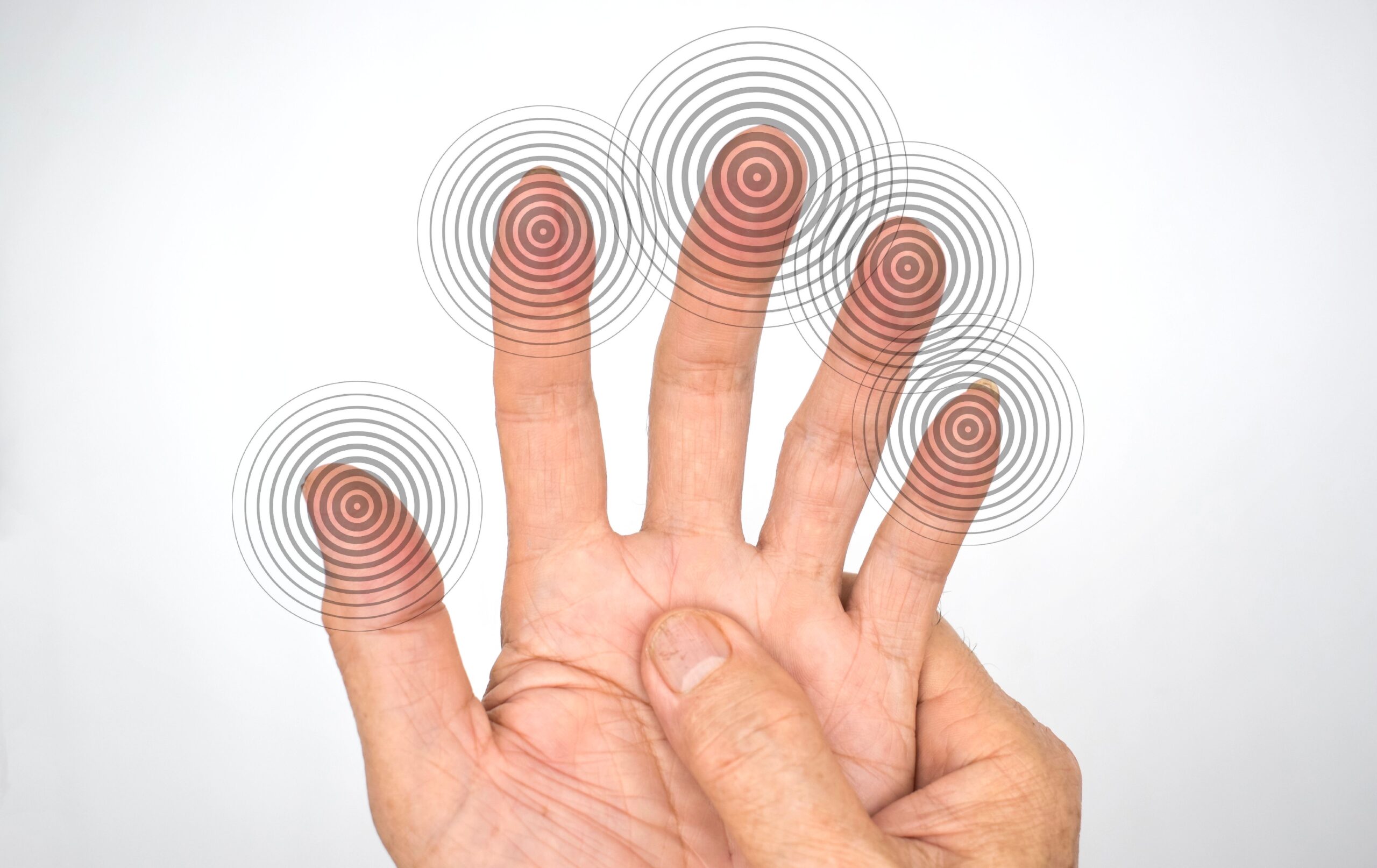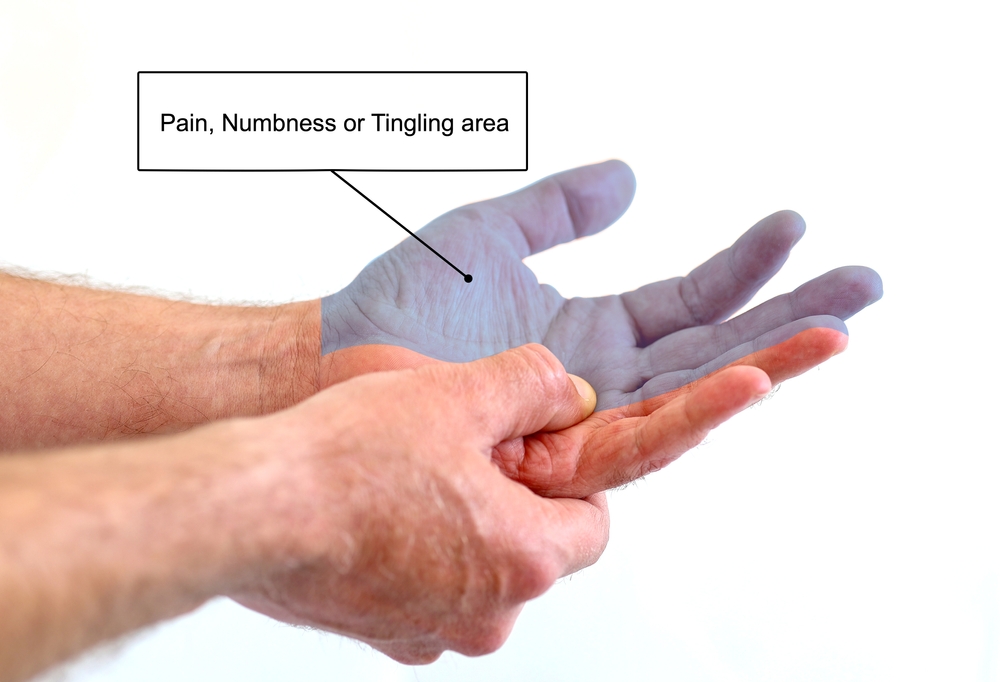Numbness occurs as a side effect of cancer treatments. It is often accompanied by tingling, and feelings of pins or needles in the hands and feet. This side effect is termed Peripheral Neuropathy. It may lead to partial or complete lack of sensation in one or more body parts, especially the hands, feet, arms, or legs.
Neuropathy After Chemotherapy:
Chemotherapy is mostly used to kill cancer cells. But it can also affect nerves that connect the spinal cord to muscles, skin, and internal organs resulting in Peripheral Neuropathy. It is a neurological side effect of certain cancers and cancer treatments, especially chemotherapy. This condition is referred to as Chemotherapy-induced peripheral neuropathy (CIPN).

Other Causes of Numbness and Tingling:
- Lead poisoning
- Nerve damage from ageing
- A slipped disc or sciatica (pain that radiates down to leg/foot)
- Pressure to the spinal cord, or neck due to ageing, or arthritis
- Vitamin B deficiency
- Shingles (viral infection that causes painful rashes)
- Migraines
- Multiple sclerosis (a diseased condition that damages nerve cells of the brain and spinal cord)
- Stroke
Patients with pre-existing diabetes, alcoholism, severe malnutrition, kidney impairment, autoimmune diseases, infections, carpal tunnel disorder (numbness and tingling of hand and arm caused by a pinched nerve in the wrist), and previously treated with chemotherapy are at higher risk of neuropathy.
Certain Cancers also Cause Peripheral Neuropathy. Such as;
- A tumour of the cerebrum that controls the sensation and movement.
- Tumours in the prostate create pressure on the spinal cord causing numbness in the feet or legs.
- Myeloma produces abnormal proteins that can damage nerves and causes numbness.
- A tumour in the spinal cord causes numbness on both sides of the body and impaired coordination in the arms or legs.
- Facial numbness from acute lymphocytic leukemia is a sign that cancer has spread to the brain or spinal cord.
- Advanced-stage lung cancer can cause numbness of limbs which is a sign that cancer has spread to the brain.
Symptoms of Neuropathy:
Depending on the type of chemotherapy drugs and dosage, symptoms of peripheral neuropathy vary widely from patient to patient. Certain types of chemotherapy affect the small sensory nerves in the feet and hands, causing symptoms like numbness, tingling, and pain. Sometimes, chemotherapy can also cause weakness, muscle cramps, and muscle fatigue.

Here is the List of Symptoms of Peripheral Neuropathy:
- Numbness, pain, and tingling of hands or feet
- Ringing in the ears
- Burning sensation of hands or feet
- Numbness around mouth
- Constipation
- Loss of sensation to touch
- Lack of sense to position (knowing where the body part is without looking)
- Weakness
- Loss of balance
- Leg cramps
- Difficulty in picking things up
- Difficulty in performing daily tasks like buttoning shirts
- Difficulty swallowing or breathing if chest or throat muscles are affected
In most cases, peripheral neuropathy affects fingers and toes, and the bowel resulting in constipation or intestinal obstruction. In very few cases, it affects the face, back, and chest. Less common symptoms include dizziness when sitting or standing up, difficulty urinating or defecating, blood pressure changes, or irregular heartbeat.
The signs and symptoms of peripheral neuropathy appear suddenly and grow gradually. It may worsen with each additional dose of chemotherapy. The symptoms are higher after 3 – 5 months of the last session of chemotherapy. It may require several months for symptoms to disappear completely or partially. Very rarely, it may be irreversible and never disappear.
Best ways to Minimize the Effects of Peripheral Neuropathy:
- Protect your body from extreme cold.
- Don’t stay in the same position for a longer time.
- Protect areas where sensation is lost (Ex. Don’t walk around with bare feet if you feel numb in your legs).
- Don’t use too hot water or too cold water for bathing, or while doing any activities.
- Be careful while cooking or washing utensils.
- Protect yourself from burns, cuts, and abrasions.
- Do gentle massage to improve blood circulation.
- Apply lotions or creams to avoid drying or cracking of your skin.
- Perform activities like deep breathing, relaxation, and guided imagery (focused relaxation or meditation) to relieve pain associated with neuropathy.
- Eat fiber-rich foods like fruits, vegetables, and cereals to combat constipation during this period. If your doctor prescribes a bowel regimen, follow it exactly.
- Drink 2 – 3 litres of water daily, unless you are told otherwise by your doctor.
- Exercise regularly for at least half an hour or as tolerated by you.

Let your treating team know if you are facing any unusual symptoms, unrelieved pain, or persistent constipation despite medication use. There are many other ways your physician can recommend to treat neuropathy. A single regimen doesn’t work for all. Ask your doctor what measures to follow to reduce the effects of neuropathy. Your treating team will prepare a regimen that suits you best.
Treatment for Peripheral Neuropathy:
To provide the proper treatment your doctor will ask about your medical history, any other medications you are taking, vaccinations, and lifestyle habits that might increase the risk. Your doctor will order blood tests, and screenings to identify the cause of your symptoms. Also, look after the functioning of your nerves with imaging tests like X-rays, MRIs, or CT scans. Sometimes, a spinal tap is suggested to check for problems in the nervous system.
The trained doctors together are involved in developing a personalized treatment plan for each patient to treat Peripheral neuropathy. Here are a few measures that your doctor might follow;
- Changing the treatments if possible.
- Adjusting the doses to stop worsening of the situation.
- In some conditions, prescribe vitamins, and pain relievers to control neuropathic pain.
- Recommend a bowel regimen to relieve neuropathy-induced constipation.
- Recommend flexible splints (flexible devices used to protect, and immobilize an injured part)
- Suggest physical therapies like regular exercise, stretching, or massages to help strengthen the muscles.
- Occupational therapy will also help to perform daily activities with assistive devices. This includes using a walker, cane, or shower chair to reduce the risk for patients if their feet are numb.
- In severe cases, therapies like acupuncture, biofeedback, or transcutaneous nerve stimulation (TENS) may also be recommended. Nerve blocks or implanted pain pumps may also help to treat underlying issues that cause numbness.
When to Contact a Doctor?
Contact your doctor right away if your symptoms of neuropathy;
- Comes and goes very often
- Persists or worsens gradually despite medication use
- Affects both sides of the body
- Difficulty in performing daily activities
- Severely affects only a single part of the body
10 Questions to Ask your Doctor about Neuropathy:
Add the below questions to your list for your visit with the doctor:
- What could be the cause of my neuropathy?
- Are my symptoms related to neuropathy or any other problem?
- Are there any medications that I can take to heal my neuropathy?
- What symptoms do I have to take seriously?
- Are there alternative therapies for my cancer?
- What dietary or lifestyle changes should I have to make?
- Is there anything that I should be more cautious about?
- When will these problems start? How long do these side effects last?
- What precautionary measures can I follow to feel better?
- Should I have to consult any other specialist for additional advice?

